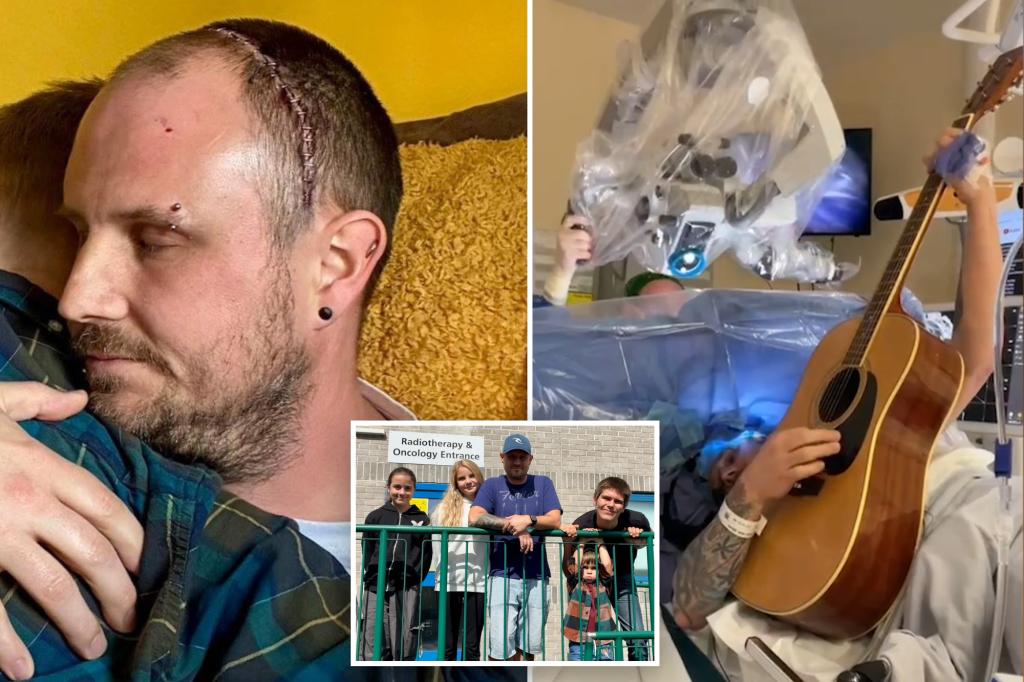Dad of Five Plays Guitar During His Brain Tumor Surgery
In a remarkable display of courage and musical passion, Paul Welsh-Dalton, a 44-year-old father of five, played his guitar while surgeons removed a kiwi-sized tumor from his brain. This extraordinary surgery took place at Derriford Hospital in Plymouth on March 28, where Paul remained conscious throughout most of the five-hour procedure. The medical team suggested incorporating Paul’s 30-year guitar-playing experience into the operation as a real-time indicator of his brain function. “Playing the guitar whilst having my brain operated on was such a surreal experience,” Paul reflected after the surgery. This rare approach allowed surgeons to monitor his cognitive and motor skills as they worked, ensuring they could preserve as much functionality as possible while removing the malignant growth.
The journey to this unusual operating room concert began suddenly on March 3 when Paul suffered a seizure in his kitchen, collapsing in front of his wife Tiff and their children. “For a moment I thought I’d lost him,” recalled Tiff, a 39-year-old adult support worker. “The children were in the room so they were freaking out.” After rushing to Derriford Hospital, tests revealed a mass on Paul’s brain, later diagnosed as an oligodendroglioma—a rare and malignant type of brain tumor. Prior to this crisis, Paul had been experiencing aphasia (language difficulties) and headaches, but the seizure forced an immediate medical intervention. Paul made the brave decision to undergo an awake craniotomy, allowing surgeons to remove the tumor while simultaneously conducting a biopsy.
During the operation, Paul strummed through an impressive playlist including Green Day’s “Good Riddance (Time Of Your Life),” Tenacious D’s “Tribute,” and Oasis’s “Wonderwall” as surgeons meticulously worked around vital areas of his brain. The medical team, led by a surgeon named Titus, used Paul’s musical abilities as a neurological roadmap. When the surgeon probed certain areas, Paul’s hands would sometimes lock up, immediately signaling to the team, “right, we can’t do that bit.” This interactive approach allowed the surgeons to successfully remove 98% of the 4cm tumor while minimizing damage to critical brain functions. Paul was only anesthetized during the initial opening of his skull and again at the end when titanium screws were fitted to close the surgical site.
Two weeks after the surgery, biopsy results confirmed a grade three oligodendroglioma—a terminal diagnosis, but one that still offered precious time. The reality of his condition hit Paul hard, especially when thinking about his youngest child. “Colby is only three as well so he was thinking, ‘if I die would he remember me,'” Tiff shared, revealing the emotional weight of their family’s new reality. Despite the grim diagnosis, the successful surgery has given Paul valuable additional time with his family, including children Max (14), Gracie (13), Maddie (12), Finnley (10), and little Colby (3). As Tiff poignantly put it, “Titus said it’s terminal but terminal doesn’t mean tomorrow.” This perspective has helped the family face each day with renewed appreciation and purpose.
Following the surgery, Paul embarked on an intensive treatment regimen to combat the remaining cancer cells. He underwent six and a half weeks of radiotherapy, targeting any microscopic tumor remnants that couldn’t be surgically removed. Looking ahead, Paul is scheduled to begin a nine-month chemotherapy program in October, representing the next phase in his fight against the aggressive brain cancer. Throughout this challenging journey, Tiff has remained steadfastly by his side, balancing her role as a caregiver to both her husband and their five children. The family has had to adjust to a new normal, with regular hospital visits becoming part of their routine and the uncertainty of Paul’s condition looming over everyday decisions.
The story of Paul’s awake brain surgery represents more than just a medical curiosity—it embodies the intersection of modern medicine, personal passion, and family love. By incorporating Paul’s guitar playing into a life-saving medical procedure, his surgical team found an innovative way to preserve what makes him who he is while fighting to extend his life. This approach recognizes that treating a patient means more than just addressing physical ailments; it means honoring their identity and what gives their life meaning. As Paul continues with his treatment plan and regular monitoring scans, he and his family face each day with the knowledge that while the future remains uncertain, they’ve already defied odds through medical innovation and personal determination. Paul’s mid-surgery concert stands as a powerful reminder of the human spirit’s resilience and our deep-seated need to express ourselves, even in the most extreme circumstances.













